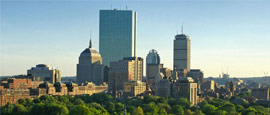Boston History
In the beginning, Boston was a small settlement for puritan families from England.
The small settlement eventually became the capital of the original Massachusetts Bay Colony founded in 1630. In 1638, America's first college, Harvard College later to become Harvard University, was established across the Charles River in Cambridge.
Then followed the Boston Tea Party in 1773 sparked by a protest against the tax policy of the British Government, which made colonies pay a tea duty. Colonists, known as Whigs, who objected to the tax charge on the basis they hadn’t elected representatives in Parliament, boarded the ships containing tea bound for England and instead threw it into the harbour.
This culminated in the Revolutionary War against British colonial rule. In the end, George Washington succeeded in driving the British out in 1776.
Steadily, Boston was transformed from a relatively small and economically stagnant town in 1780 to a thriving seaport. By 1800, it had become one of the world's wealthiest trading ports, exporting products like rum, fish, salt and tobacco. It population grew and by 1822, Boston was granted city status.
Manufacturing industries boomed, particularly in garments, leatherware and machinery. The 1840s brought new waves of immigrants from Europe, especially Italians and Irish, giving the population a Roman Catholic bias.
Around the same time, the abolitionist movement was established in Boston by the social reformer William Lloyd Garrison. High culture also flourished in the city – and the city became linked to key intellectuals, writers, theologians and philosophers. The Massachusetts Institute for Technology was established in 1865, followed by the first medical school for women and the country’s first vaudeville theatre.
During the late 20th century, the city thrived and its universities attracted hordes of students who decided to settle in Boston permanently. It’s been followed by tremendous strides in public transport but at the same time, the city’s chronic congestion problems have not eased.
Although it is considered to be one of the world’s most expensive cities – reflected too in its lack of cheap hotels - it has a unique ambience and has been compared flatteringly to many European cities.
Did you know?
• Boston was originally called 'Trimountain', given its location beside three hills on the mouth of the Charles River.
• In 1919, the city was pummelled by the freakish Boston Molasses Disaster, when a huge tank collapsed, unleashing an immense wave of molasses up to 15ft high down the streets, killing 21 and injuring over 100.
• In the world of sport, the Boston Red Sox won their first World series in 86 years in 2004, and again three years later.
Do you have any Feedback about this page?
© 2026 Columbus Travel Media Ltd. All rights reserved. No part of this site may be reproduced without our written permission, click here for information on Columbus Content Solutions.




 You know where
You know where